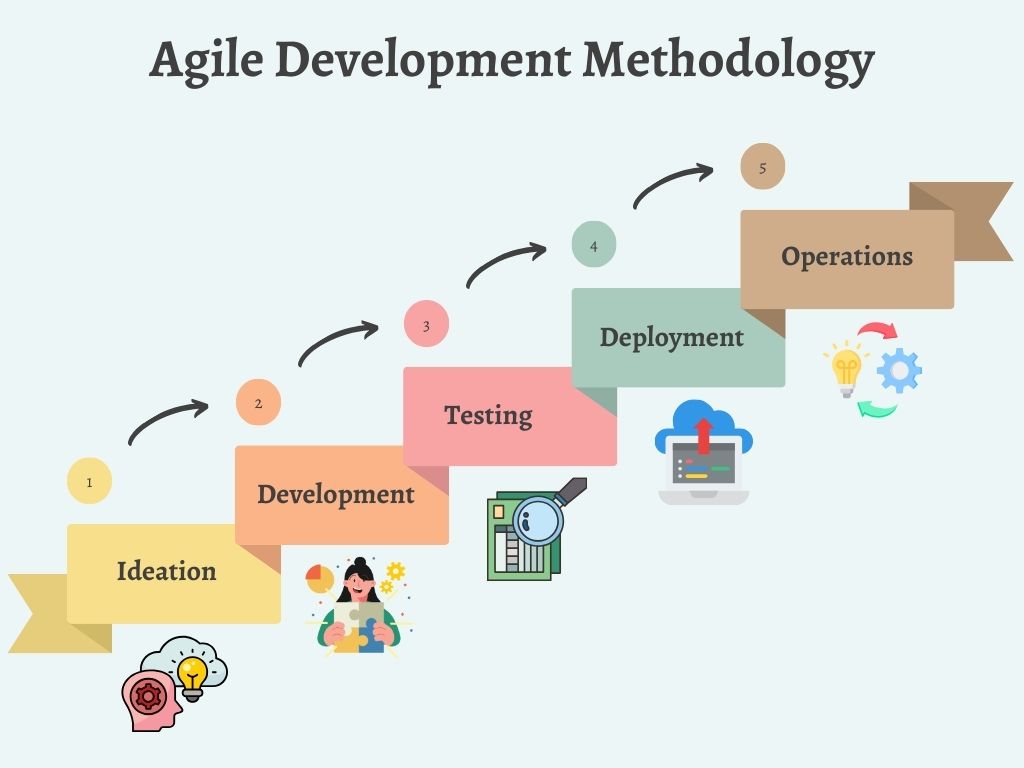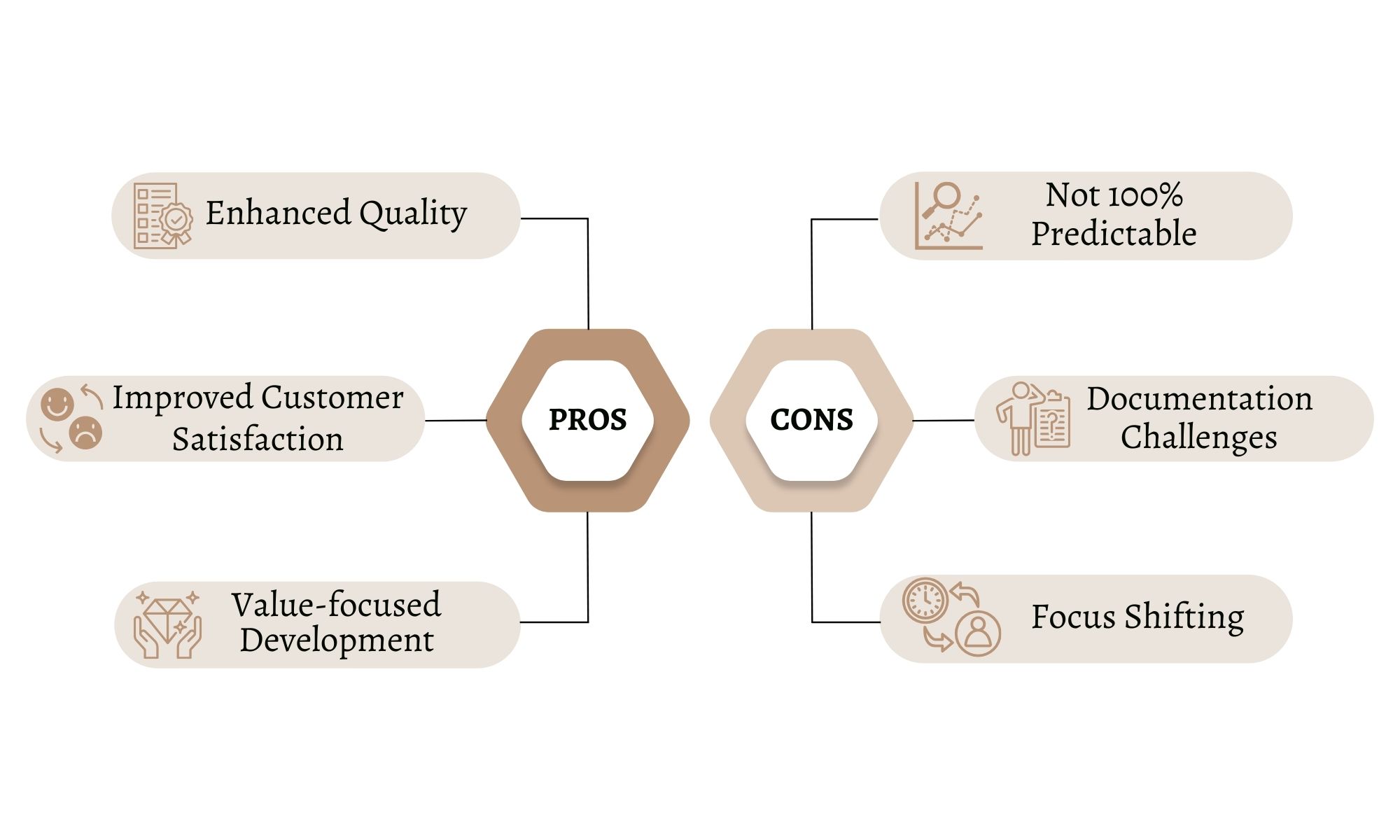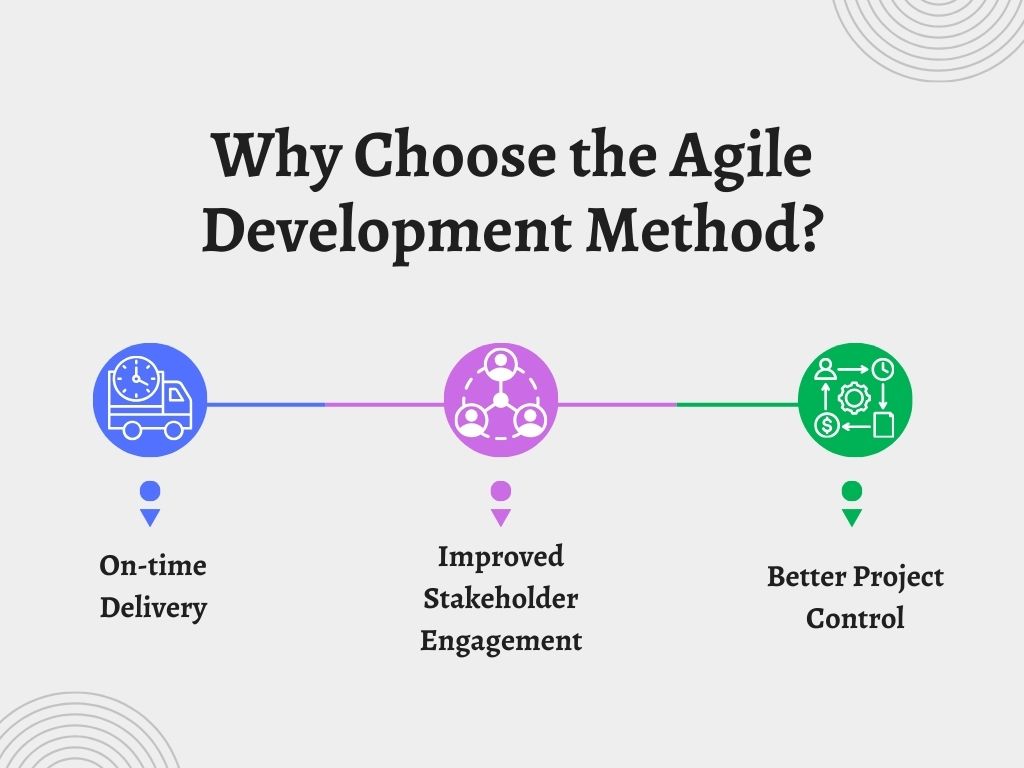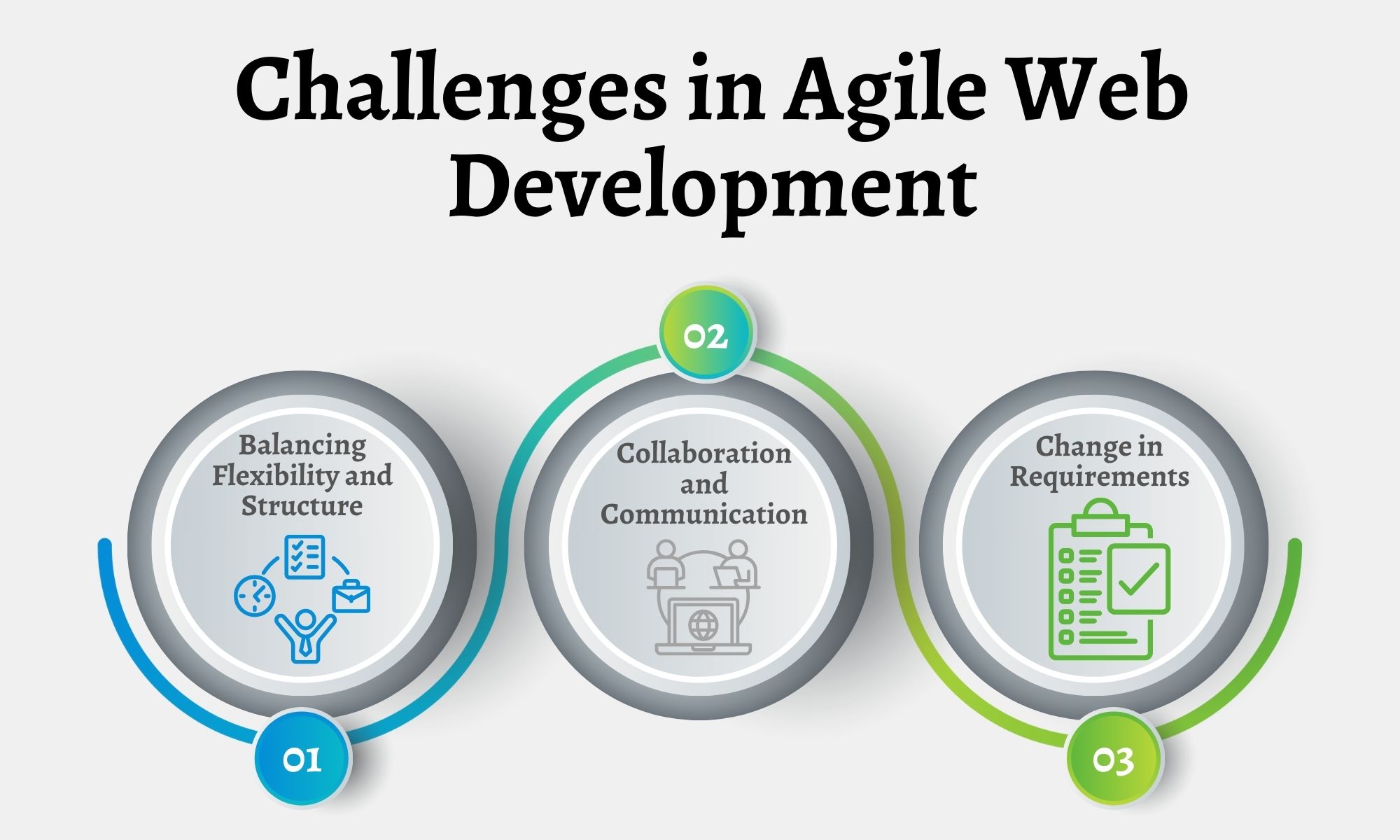- Overview of Agile Web Development
- Pros of Agile Web Development
- Cons of Agile Web Development
- Why Choose the Agile Development Method?
- Traditional vs Agile Web Development Methodology
- Tools for Agile Web Development
- Challenges in Agile Web Development
- Best Practices in Agile Web Development
- Trends to Follow in Agile Software Development
- How to Find the Right Agile Software Development Company?
- How can CSSChopper help you in Agile web development?
The current time is full of competition, and a new business website or web application is launched daily. This fierceness puts a premium on speed, as a delay in delivering web solutions can leave you in the dust. Hence, the need for a web development methodology emerges, which serves as a beacon of efficiency, speed, and quality. Here, Agile web development methodology and agile application development are mainly preferred.
Have you ever wondered why businesses or developers focus on agile development methodology? What is agile web development that makes it so popular over the traditional approach? This is mainly due to its efficiency and adaptability. Over 64% of businesses prefer to utilize this methodology. Traditional development methodologies often struggle to keep pace, increasing time and also augmenting the cost graph.
Agile methodology for website development has reshaped the custom software development, design, and deployment process. It is an iterative and collaborative approach that fosters continuous improvements. But is it truly living up to the hype? Can it deliver on all its promises? So, let’s delve deeper to understand.
Overview of Agile Web Development
This flexible and iterative approach to developing web solutions prioritizes collaboration, adaptability, and regular upkeep. It is based on the Agile software development principle outlined in the Manifesto. It works with various specific methods like Scrum and Extreme Programming, popularly known as XP; though they existed before the Manifesto was written, they still fall under the agile umbrella.

The core idea behind the evolution of this approach is not only to provide flexibility but also continuous improvement in web development solutions. The main goal of agile based development is the early delivery of working projects. This is done by streamlining tasks and eliminating the ones that consume a lot of time.
Pros of Agile Web Development
Agile for developers is undoubtedly better, for project managers, designers, and users. Why for users? They receive their projects within the deadline, allowing them to stay competitive in the market. This is just one advantage of this approach, the reader further understands some of the main ones.
1. Enhanced Quality
The agile web development process helps formulate projects with better quality. This is because of the core principle on which this methodology is based: dividing a project into various iterations. These minor diversions help agile developers find any errors during the agile development process and resolve them as quickly as possible by not touching other sections that are performing fine. This improves the quality of a project as problems can be addressed during the development of different sections.
2. Improved Customer Satisfaction
After receiving a project, a business aims for customer satisfaction as its primary goal. The agile approach helps improve this through continuous feedback. By emphasizing developers, stakeholders, and users in a loop, a company that uses this approach ensures that customer requirements are met through continual refinement.
3. Value-focused Development
Agile software development is based on value-focused development by prioritizing features that relate to the core values of a business. This creates a better understanding between the client and the team, which allows them to analyze the focus point during the project. This way, a team responsible for successful project delivery understands what’s more important for the client’s business and employs their tactics to deliver the best values.
4. Minimize Risks
A web development project is highly vulnerable to various risks, like performance, scalability, and responsiveness. All these require intensified time and effort of skilled web developers. As a result, project delivery time would be extended, making it difficult for a business to thrive from the competition.
However, with the advent of Agile methodology in web development in 2001, all these risks have been minimized. How did this happen? Earlier methods did not focus on regular testing at different levels, which the agile development method does. This mitigates the project failure risks.

Cons of Agile Web Development
Like every other approach or methodology of web development, Agile software development is not perfect. If it’s not utilized to the fullest of its potential, its underlying benefits can become the reason for demise. Some of the most common cons of this methodology are as follows:
1. Not 100% Predictable
Web developers engaged with projects sometimes can not elucidate the time of project competition. This is especially true when they are dealing with large-scale products, or the team you have partnered with is new to agile development. This fear is the reason behind bad practices and frustration, which leads to poor decisions.
2. Documentation challenges
Project documentation is less detailed because all the project requirements are stated during development. Now, how is this challenging? When new members join a team, they will be clueless about how a particular feature should perform. This ultimately creates difficulties and misunderstandings.
3. Focus Shifting
Agile software development methodology involves focus shifting. This is where a development team can focus on the aspects which require more attention. Sometimes, it can be difficult for a team to simultaneously focus on a single goal. Hence, it becomes essential to keep every member of the team in a loop to remove this hindrance.
Why Choose the Agile Development Method?
The agile approach to web development has gained significant traction since its launch. It has changed how web solutions are built and maintained, which was not possible earlier. Why? This is because the traditional (Waterfall) approach was rigid and sequential, which the agile approach is not. Hence, investing in Agile development can be the underlying solution; here’s how to find it.
1. On-time Delivery
The current market is growing rapidly, and a business needs to adapt to market conditions. On-time project launches bring significant advantages to a business by keeping it alive in the competition. Agile web development enables on-time delivery as the project is divided into smaller, manageable chunks. This makes a team work on it faster, tests it, and ensures it works optimally.

2. Improved Stakeholder Engagement
Stakeholder engagement enables the agile project management team to understand their client’s vision. This helps them develop client-centric web development projects that drive value to their user’s businesses.
3. Better Project Control
The iterative approach in agile project management allows better project control. This involves everything from breaking a project into smaller tasks to continuously assessing it. Moreover, the regular sprints allow for frequent reviews and adjustments, ensuring the project stays on track and aligned with the client’s evolving needs.
Traditional vs Agile Web Development Methodology
Traditional and agile software development approaches are the methods of designing and developing a working system solution. However, they share some notable differences that are equally important to understand. Some of the significant differences are elaborated below:
| Parameters | Traditional Software Development | Agile Software Development |
| Development Type | It is used to develop simple projects | The agile approach helps develop complex projects |
| Testing | Only once after the development phase is completed | Testing and development go hand-in-hand |
| Planing | It follows extensive upfront planning. | Iterative planning that emphasizes continuous improvements |
| Security | It is less secured | Security is highly preferred |
| Client Involvement | Less in traditional software development approach | The agile methodology enables a client to be involved actively |
| Development Process | Follows sequential process | Iterative and incremental |
| Feedbacks | After the development phase | Continuous feedback during the development phase |
| Flexibility | Changes are complex to be made | Highly flexible approach, making it easier to change |
| Deliverables | A complete project is delivered after it is completed | The agile methodology enables the delivery of working web solutions in iterations. |
| Models-based | Waterfall, Spiral, V-model, and incremental model | Scrum, Extreme Programming (XP), Kanban, and so on |
| Risk Management | At the beginning of a web project | Ongoing risk management and mitigation. |
Tools for Agile Web Development
Agile development is an iterative approach to web development that prioritizes effective collaboration, efficiency, and simplified workflow. Various tools play an essential role in facilitating it. These are as follows:
1. Version Control Systems
These help improve collaboration, as the team can track and manage the changes in the codebase, collaborate on code, and shift to the previous version when required. One commonly used version control tool is Git, which provides various platforms like GitHub, Bitbucket, and others. This allows developers to work efficiently, merge, and maintain code integrity.
2. Project Management Tools
Agile project management professionals ensure the project is delivered according to expectations. They collaborate, track results, and monitor project progress using tools like Jeera, Trello, ClickUp, and, if not, custom tools. This not only helps teams stay updated and organized but can also visualize the project process.
3. Communication
An agile web development services provider utilizes various communication tools to ensure everything stays streamlined. These tools constantly deliver information to users. Tools like Slack, Skype, and other apps play an essential role. This way, they can ensure optimum communication with clients.
4. Quality Assurance Tools
Testing is integral to Agile web development. A company’s expert developers and testers can skillfully automate different test types, like unit, integration, or functional tests. An Agile web development company writes and implements codes to ensure the stability and functionality of web solutions with tools like Selenium, JUnit, and others.
Challenges in Agile Web Development
The agile approach to web development offers various benefits to a business. It also comes with multiple challenges. Some of them are illustrated below:
1. Balancing Flexibility and Structure
The agile software development methodology mixes flexibility and adaptability. Sometimes, finding the right balance between flexibility and structure can be difficult, posing a potential challenge to web development. Excessive flexibility can derail a project and cause poor management, while a lack of structure can hinder responsiveness and innovation. Hence, flexibility and structure should be balanced perfectly for improved project quality.

2. Communication and Collaboration
The development and delivery of a successful agile project rely on the communication and collaboration of the team. When teams are distributed according to the different time zones where language is different, it hinders collaboration among team members. Hence, maintaining a transparent communication process brings the utmost value in improving communication and collaboration.
3. Change in Requirements
This is also one of the significant challenges in Agile web development. Frequent changes in requirements can impact the development process. When a project needs to change randomly, it can automatically increase the delivery time and budget.
Best Practices in Agile Web Development
Challenges stand like a cornerstone in the path of successful web development. Do you know you can tackle them if you follow the best practices of agile web development methodology? Let’s understand them:
1. User-Centric Web Development
Keeping users in the loop is the best way to meet their expectations. This allows a skilled team of Agile experts to understand all the requisites a user is looking for in the project and how they should be met.

2. Test-Driven Development
Tests are essential in making your project successful and error-free. It is essential that a skilled team should write unit tests before performing any coding related to the project. This will not only improve the code quality but also ensure that bugs are caught early.
3. Document-focused
Poor documentation is one of the biggest challenges in agile web development, impairing project success. Also, note that agile does not mean no documentation. Instead, one has to maintain it properly. This will help you as a company maintain everything you need, from user stories to API references.
Trends to Follow in Agile Software Development
Agile software development is constantly evolving to keep pace with the latest market trends related to technology or project management. Trends have set a new and better tone for this approach. Let’s delve into some of the jaw-stammering trends.
1. Technical Agility
Who is not aware of the advancements and pace of technology at this time? The Agile approach is also not left behind in this wave. The amendment of Artificial Intelligence and Machine Learning has helped a business improve its efficiency by automating tasks. Moreover, the integration of DevSecOps (Development, Security, and Operations) ensures that security is supported throughout the development cycle.
2. Workflow Evolvement
With the rise in remote working, agile web development service providers need to ensure effective communication and collaboration. They should utilize the right tools and methods to improve transparency across distributed teams. Also, they should focus on data-driven decisions to track progress and identify areas for improvement.
3. Frameworks for Agile Web Development
Projects can be simple, average, or way too complex. All require a particular set of understanding and planning. Agile frameworks like SAFe (Scaled Agile Framework) or LeSS (Large Scale Scrum) can help with larger and more complex projects. However, moderate frameworks or customized approaches can work for simple to average projects.
How to Find the Right Agile Software Development Company?
Finding the right company that is skilled in agile development is challenging. You need to perform various steps or consider some factors that are highly essential in finding the right company for your business needs. Let’s understand them:
1. Evaluate the Company’s Expertise
You should assess the company’s expertise and experience. Understanding their technical proficiency, understanding of agile methods, and how updated and familiar they are with advanced and relevant technologies is crucial.
2. Review Their Portfolio
Keep an eye on the portfolios of custom web development service providers. This will provide you with a better understanding of their skills and vast range of experience in different industries. In order to check this, you should perform an in-depth review to check the quality of the developed projects.
3. Check on their Approach
You should evaluate their approach to project management and whether they are effectively using agile development components, like backlog management and sprint execution.
4. Assess Their Communication
Evaluate the communication channels a company uses to ensure a smooth and transparent process. You can evaluate this through their responses and availability, as well as through their previous clients, to know how promptly they respond to user queries.
5. Schedule an Interview
You must have selected some Agile web development specialists that best fit the needs of your project. The next step is to schedule an interview and ask specific questions to better understand their agile software development approach and methodologies. Moreover, ask for references to get feedback about their performance and meeting deadlines.
How can CSSChopper help you in Agile web development?
The traditional (Waterfall) approach was not flexible, which increased project delivery times. Not only was this an issue with waterfall methodology, but delayed testing and not prioritizing user needs were also present. This is where a company skilled in the agile approach brings value to a business.
CSSChopper is the go-to company when it comes to agile website development. Our team helps organizations receive better quality software within the deadline. We boost team productivity by managing priorities better. Moreover, our team follows all the Agile development components with a skilled and experienced team.
We emphasize informing you about your project’s progress and ensuring complete transparency. Over the years, we have worked with various clients in different business verticals, like healthcare, real estate, edtech, and others, and helped them stay competitive with agile development. You can hire a dedicated team that best suits your project needs within the Agile framework.
Categories
Recent Posts
Popular Posts
- How to Choose a Reliable Offshore Development Partner?
- Transforming Web Development with HTMX’s Declarative Approach for Dynamic UIs
- Why Your Conversion Funnel Needs a Composable Commerce Solution?
- How to Outsource Web Development in 2025: Complete Guide
- What are the Top Web Development Trends for 2025?




